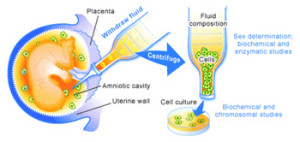Preimplantation genetic diagnosis is an advanced technology used to screen embryos for genetic disorders before transferring it in to the uterus. The chance of inheriting certain genetic disorders from the parents to the child can be avoided.

INDICATIONS
- One or both parents are screened and found carrier of the genetic defects.
Repeated IVF failure - Gene mutations causing Alzheimer disease and hereditary breast cancer
- Advanced maternal age usually over 35
- Recurrent miscarriages
- Pregnancy with abnormal genetic conditions in the past
PROCEDURE
The embryo should be produced through in vitro fertilization (IVF). Ovaries are stimulated using hormones to produce multiple eggs. Then a small opening is made in the shell covering of embryo called zona pellucida and dividing blastomeres are accessed. The aim is to get enough cellular material without harming the embryo.
Cell biopsy can be done in two stages
- Cleaved embryo stage: 3days after fertilization
- Blastocyst stage: after 5-6 days of fertilization
The cell collected from embryo is then tested under microscope for genetic imbalances.
DISEASES AND CONDITIONS DETECTED
Preimplantation genetic diagnosis can detect sex linked diseases and abnormalities that causes recurrent miscarriages. The common diseases and conditions detected using PGD are,
- Achondroplasia
- Alzheimer’s disease
- Aneuploidies
- Cystic fibrosis
- Huntington’s disease
- Phenylketonuria
- Translocations
- Alpers Syndrome
- Congenital Adrenal Hyperplasia
Only embryos without genetic defects are used for transfer or genetic implantation.
OBJECTIONS
- Destruction of human embryos is controversial
- Only rich can afford the cost of this procedure as it is highly expensive
- Genetic defects are not always going to happen in an individual after birth
- Some genetic disorders develop symptoms in their 30’s or 40’s. Before reaching this, treatment and cure is possible
- Increased chance for female feticide
ADVANTAGES
- This procedure is conducted before the beginning of pregnancy. It can avoid risk of abortion and stress of parents.
- Many genetic disorders can be prevented from transmitting to next generation.
- Healthy babies without genetic disorders can be produced.
- Risk of diseases can be predicted.
- Family balancing
RISKS
- Multiple embryos are usually implanted in the uterus to improve the success of IVF. It may create pregnancy complications.
- The safety of test for both the women and resulting baby are still not clear.
- The greater chance of sex determination and female feticide
Anyway PGD is a powerful tool that may allow parents to identify and select only the embryos with desired traits. It gives hopes to many couples who are getting their babies through in vitro fertilization.